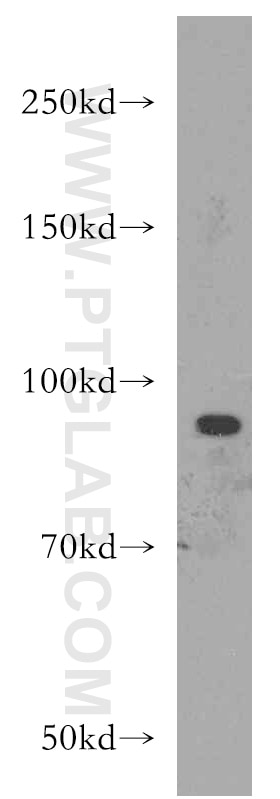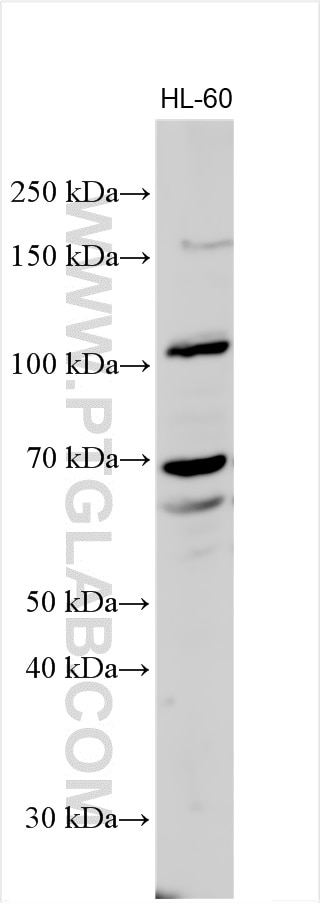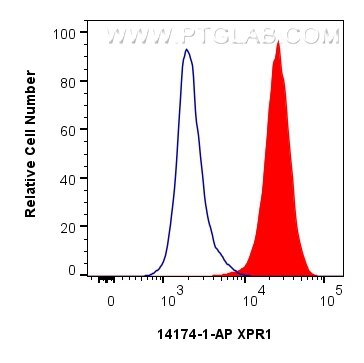This product has been discontinued. We recommend 84902-1-RR as an alternative.
For more information, please contact us.
Tested Applications
| Positive WB detected in | Jurkat cells |
| Positive FC (Intra) detected in | Jurkat cells |
Recommended dilution
| Application | Dilution |
|---|---|
| Western Blot (WB) | WB : 1:500-1:2000 |
| Flow Cytometry (FC) (INTRA) | FC (INTRA) : 0.25 ug per 10^6 cells in a 100 µl suspension |
| It is recommended that this reagent should be titrated in each testing system to obtain optimal results. | |
| Sample-dependent, Check data in validation data gallery. | |
Published Applications
| KD/KO | See 2 publications below |
| WB | See 8 publications below |
| IHC | See 1 publications below |
| IF | See 1 publications below |
Product Information
14174-1-AP targets XPR1 in WB, IHC, IF, FC (Intra), ELISA applications and shows reactivity with human, mouse, rat samples.
| Tested Reactivity | human, mouse, rat |
| Cited Reactivity | human, mouse, rat |
| Host / Isotype | Rabbit / IgG |
| Class | Polyclonal |
| Type | Antibody |
| Immunogen | XPR1 fusion protein Ag5373 Predict reactive species |
| Full Name | xenotropic and polytropic retrovirus receptor |
| Calculated Molecular Weight | 696 aa, 82 kDa |
| Observed Molecular Weight | 82-84 kDa |
| GenBank Accession Number | BC041142 |
| Gene Symbol | XPR1 |
| Gene ID (NCBI) | 9213 |
| RRID | AB_10642569 |
| Conjugate | Unconjugated |
| Form | Liquid |
| Purification Method | Antigen affinity purification |
| UNIPROT ID | Q9UBH6 |
| Storage Buffer | PBS with 0.02% sodium azide and 50% glycerol, pH 7.3. |
| Storage Conditions | Store at -20°C. Stable for one year after shipment. Aliquoting is unnecessary for -20oC storage. 20ul sizes contain 0.1% BSA. |
Background Information
XPR1 is a receptor for xenotropic and polytropic murine leukemia retroviruses and a homolog of yeast Syg1 and plant Pi transporter PHO1 (PMID: 20633538). XPR1 has been identified as an atypical G-protein-coupled receptor. Xenotropic or polytropic retrovirus binding to XPR1 can disrupt the cAMP-mediated signaling function of Xpr1, leading to the apoptosis of infected cells (PMID: 22090134). A band of about 82-100 kDa is probably due to abnormal migration of the protein or post-translation modifications. In addition, a band of about 55-72 kDa may be isoforms and fragments.
Protocols
| Product Specific Protocols | |
|---|---|
| WB protocol for XPR1 antibody 14174-1-AP | Download protocol |
| Standard Protocols | |
|---|---|
| Click here to view our Standard Protocols |
Publications
| Species | Application | Title |
|---|---|---|
Proc Natl Acad Sci U S A Control of XPR1-dependent cellular phosphate efflux by InsP8 is an exemplar for functionally-exclusive inositol pyrophosphate signaling.
| ||
Cancer Sci PHOSPHATE exporter XPR1/SLC53A1 is required for the tumorigenicity of epithelial ovarian cancer
| ||
Biochem Biophys Res Commun Golgi damage caused by dysfunction of PiT-2 in primary familial brain calcification | ||
J Med Invest Effects of EOS789, a novel pan-phosphate transporter inhibitor, on phosphate metabolism : Comparison with a conventional phosphate binder | ||
Cancer Cell Int CircGNB1 facilitates the malignant phenotype of GSCs by regulating miR-515-5p/miR-582-3p-XPR1 axis | ||
Cell Rep Homeostatic coordination of cellular phosphate uptake and efflux requires an organelle-based receptor for the inositol pyrophosphate IP8 |







